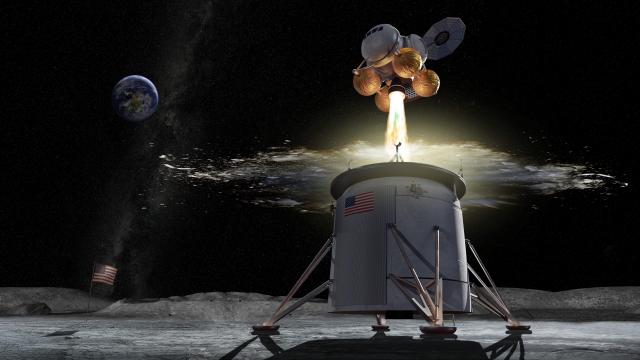A recently proposed U.S. House bill that calls for NASA to send humans to Mars in 2033 is coming under fire from scientists who think it would be a mistake to assign secondary importance to a lunar mission and to neglect technological contributions from the private sector.
As we reported last week, the proposed authorisation bill was introduced by the U.S. House Committee on Science, Space, and Technology on January 24. The bill, called the National Aeronautics and Space Administration Authorization Act of 2020, makes a number of key recommendations, including a revised timeline that would see Americans land on the Moon in 2028 instead of 2024, as mandated by the Trump administration. The bill also suggests an aggressive timeline that would see Americans on Mars by 2033, along with a directive that would preclude or at least limit private sector participation in the development of the Artemis lunar lander.
The proposed legislation, also known as H.R. 5666, immediately drew complaints from NASA chief Jim Bridenstine, who said the bill would impose “significant constraints” on the agency’s ability to reach and explore the Moon and that it would hinder NASA’s “ability to develop a flexible architecture that takes advantage of the full array of national capabilities—government and private sector—to accomplish national goals.”
Congress, it would appear, wants NASA to restore some of its development capabilities, which the agency has been off-loading for years now, recruiting the help of private partners such as Boeing Aerospace, SpaceX, and Lockheed Martin. It’s possible that Congress wants the government to maintain ownership of certain space tech or that it’s frustrated with the rash of manufacturing delays (or both).
Regardless, Bridenstine is not alone in his criticisms of the pending bill, as a number of scientists have spoken out against the bipartisan bill in its current form. In a letter published this past Friday, more than a dozen “concerned scientists” expressed their misgivings, some of which echoed Bridenstine’s comments.
The signers of the open letter included Jack Burns from the Department of Astrophysical and Planetary Sciences at the University of Colorado (CU) Boulder, Lillian Ostrach from the U.S. Geological Survey, and Bradley Jolliff from Washington University in St. Louis, among other scientists, mission planners, and engineers—some of whom were involved with the Apollo missions and some now involved with the Artemis lunar mission.
In the letter, the scientists said they have “grave concerns” about the bill and that revisions are necessary.
Under the House plan, NASA would be directed to build the human lander system for the Artemis mission, which would be “fully government-owned and directed,” according to the proposed bill. The authors of the letter said “a wholly taxpayer-funded human spaceflight program is not sustainable” and that it’s “critical that the American taxpayer be shown that there can be a tangible return on the investment of sending humans to survive and thrive off planet Earth.”
A stronger objection had to do with the overarching philosophy of the proposed bill, which considers the Moon a stepping stone to Mars rather than a critically important target unto itself.
The bill appears “to have been written with the false perspective that the Moon has no intrinsic value as a destination and that its resources and experience gained operating there make no contribution to further Mars exploration activities,” reads the letter. “Our strong assertion is that the Moon is an enabling asset that will foster sustainable human exploration of Mars, while expanding the economic sphere of the United States and our international partners.”
An ongoing presence on the Moon, the authors argue, would foster scientific and technological discoveries in addition to introducing commercial opportunities, such as space tourism and mining.
The proposed bill, the letter says, would also preclude projects designed to leverage resources from the Moon, namely resources that could sustain a prolonged lunar mission. This would be a lost opportunity, the scientists argue, as “it is critical that we learn to ‘live off the land’ beyond the Earth.”
The signers of the letter said that, under the House plan, the U.S. wouldn’t be sufficiently prepared for a crewed mission to Mars, saying we still need to develop such things as protection from radiation and habitable crew modules. By “prohibiting NASA in the Moon to Mars program from setting up a lunar outpost, more risk is added to sending humans to Mars as much longer periods on the Martian surface are required, which we are technologically and operationally unprepared to handle,” wrote the authors.
Indeed, U.S. Congress appears to be expediting a mission to Mars in a way that recalls the space race of the Cold War era. But instead of racing the Soviet Union to the Moon, the U.S. is now racing China, Russia, and potentially the private sector to Mars.
The Planetary Society, a non-government organisation dedicated to advancing space science and exploration, is likewise unhappy with the bill in its current form. In a statement sent to Gizmodo, the Planetary Society said it appreciates the House’s commitment to Mars and other future endeavours, but the new bill would “disrupt and delay a planned return of U.S. astronauts” to space. In particular, the group recommends that the committee “remove the provisions restricting activities and limiting competition for exploration capabilities”—in other words, remove the limits on the private sector’s participation in the missions.
The House Subcommittee on Space and Aeronautics recently reviewed H.R. 5666 during a markup session, but no major amendments were made to the document, reports SpaceNews. The bill’s passage was approved, but the 102-page document could face further revisions as it travels up the legislative food chain.
Given the barrage of criticisms, however, it’s possible that U.S. Congress will take notice and make the recommended changes. If it doesn’t, that would suggest Congress is ready to take NASA in a new direction. But will it be prepared to foot the bill?
